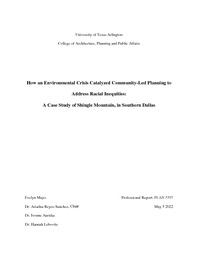
ATTENTION: The works hosted here are being migrated to a new repository that will consolidate resources, improve discoverability, and better show UTA's research impact on the global community. We will update authors as the migration progresses. Please see MavMatrix for more information.
Show simple item record
| dc.contributor.author | Mayo, Evelyn | |
| dc.date.accessioned | 2022-06-09T15:51:48Z | |
| dc.date.available | 2022-06-09T15:51:48Z | |
| dc.date.issued | 2022-05-05 | |
| dc.identifier.uri | http://hdl.handle.net/10106/30344 | |
| dc.description.abstract | Equity is one of the “Four E’s” representing the core values for planning at the City of Dallas, Texas (City of Dallas, Core Values). However, many neighborhoods in Southern Dallas endure environmental injustices partly because land use planning ignores or disregards the needs of low-income communities of color. This report examines the Shingle Mountain environmental
justice crisis in Southern Dallas to illuminate the environmental injustices that the community of
Floral Farms has endured partly due to misguided planning and the neglect of the city of Dallas.The study focuses on examining how the grassroots, community-led land use plan developed by residents from Floral Farms has enabled community organizing among a bilingual community. I argue that community-led plans can inform city planning policies and at the same time enable equitable approaches to planning. This report calls for a better understanding and integration of
community-led plans in city planning. This report examines how the City of Dallas includes or disregards community-led plans in city planning. The report finds that to date, community-led plans developed by wealthier
communities are included into policy while those developed by low-income communities and minorities, as exemplified by Floral Farms are disregarded. By comparing the actions and inactions of the City of Dallas in the Floral Farms case study to the other adopted neighborhood-led plans in the city, this report identifies best practices for integrating and leveraging community knowledge in city land use planning to address inequities. Specifically, this report identifies how cities can best support communities that have dealt with environmental justice issues in past land use plans and policies through neighborhood-led planning and makes recommendations based on the experiences of Floral Farms. | |
| dc.description.abstract | | |
| dc.title | How an Environmental Crisis Catalyzed Community-Led Planning to Address Racial Inequities: A Case Study of Shingle Mountain, in Southern Dallas | en_US |
Files in this item
- Name:
- Professional Report _Final_5-5 ...
- Size:
- 1.661Mb
- Format:
- PDF
This item appears in the following Collection(s)
Show simple item record


